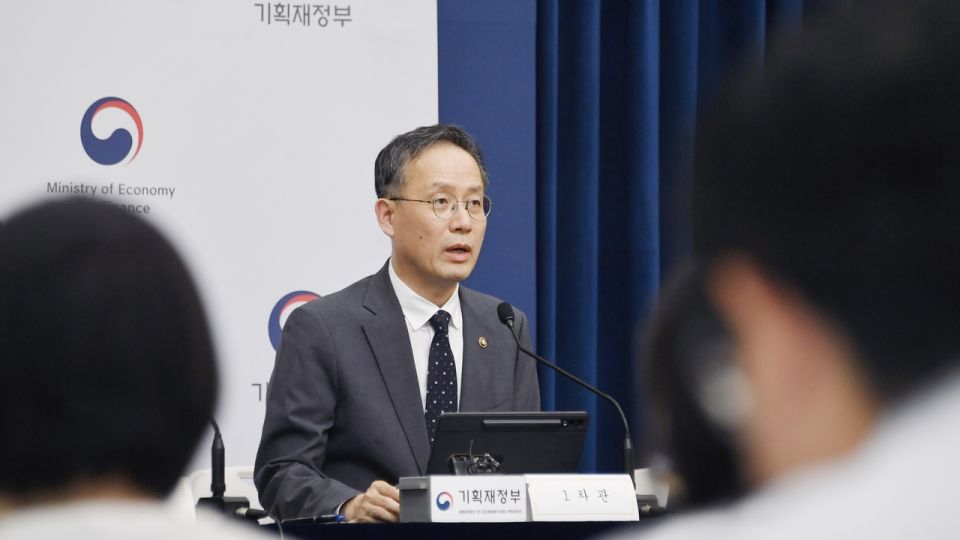August 1, 2025
SEOUL – President Lee Jae Myung’s first tax code overhaul, unveiled Thursday, focuses on reversing the tax relief introduced under his predecessor over the past three years, chiefly by raising tax rates on corporations and high-income individuals.
“The country’s tax revenue base has eroded sharply over the past three years, leading to a significant drop in the tax-to-GDP ratio,” First Vice Finance Minister Lee Hyoung-il said Tuesday during a press briefing. “This year’s tax revision aims to support economic growth and stabilize livelihoods, while also rebuilding that weakened base to ensure fiscal sustainability.”
Korea’s tax burden ratio fell to 19 percent in 2023, well below the OECD average of 25 percent. It fell further to 17.6 percent last year, the lowest level since 2016.
Tax revenue declined for two consecutive years, reaching 336.5 trillion won ($241.7 billion) in 2024, down 7.5 trillion won from the prior year and falling short of projections by 30.8 trillion won.
The overhaul, the first under the Lee administration, is projected to generate an additional 8 trillion won. The ministry plans to submit the bill to the National Assembly before Sept. 3.
The most significant change is a 1 percentage point hike across all corporate tax brackets, with the top rate — applied to companies earning over 300 billion won — returning to 25 percent.
“We’re restoring the corporate tax rate to its 2022 level to strengthen the tax base,” Vice Minister Lee said. “The additional revenue will be funneled back to businesses through support for ultra-innovative product development.”
Companies earning under 200 million won will face a 10 percent rate; those earning between 200 million and 20 billion won, a 20 percent rate; and firms earning between 20 billion and 300 billion won, a 22 percent rate.
The plan may draw criticism for bucking the global trend of lowering corporate taxes to boost competitiveness. Korea’s top rate of 24 percent already exceeds the 21.5 percent average among member countries of the OECD and the rates of key trading partners.
The revision also introduces a domestic minimum top-up tax, targeting local subsidiaries of foreign-headquartered firms whose effective tax rate falls below the global minimum of 15 percent. With the DMTT, Korean authorities will collect the shortfall directly.
The overhaul tightens capital gains tax rules for major shareholders by lowering the threshold for taxation from 5 billion won in stock holdings to 1 billion won. Shareholders above that level will face tax rates ranging from 20 to 30 percent.
“The easing of major shareholder rules had a limited effect on boosting the stock market, while raising concerns over tax equity,” the Finance Ministry said, noting stock prices rose when the rules were tightened in 2017 but fell after the threshold was eased in 2023.
The ministry is also reinstating the stock transaction tax, which had been phased out under a now-scrapped plan to introduce a financial investment income tax. The total rate will return to 0.2 percent, matching its 2023 level.
To ease the burden on investors, the government plans to introduce a separate taxation scheme for dividend income. Currently, dividends are taxed at a flat 15.4 percent rate for annual income up to 20 million won, with any excess taxed as consolidated income at progressive rates of up to 49.5 percent.
Under the proposed revision, dividend income would be taxed separately under a three-tier structure: 14 percent for income under 20 million won, 20 percent between 20 million and 300 million won, and 35 percent above 300 million won.
To encourage corporate dividend payouts, dividend payments will be newly added to the list of qualifying income circulation categories under the tax incentive for promoting investment and mutual cooperation. The scheme imposes additional taxes on retained earnings not used for designated purposes, such as capital investment and wage increases.
The revision boosts support for strategic industries, with a focus on artificial intelligence, which will be newly designated as a national strategic technology along with five related subcategories. The designation qualifies sectors for higher tax credits on R&D and investment. A 50 percent income tax break for AI professionals returning to Korea will be extended through 2028.
Tax incentives will also expand for R&D in next-generation mobility and transportation technologies, as well as for defense firms entering the global defense supply chain.
The content industry will receive added support, including a new tax credit for webtoon production.


